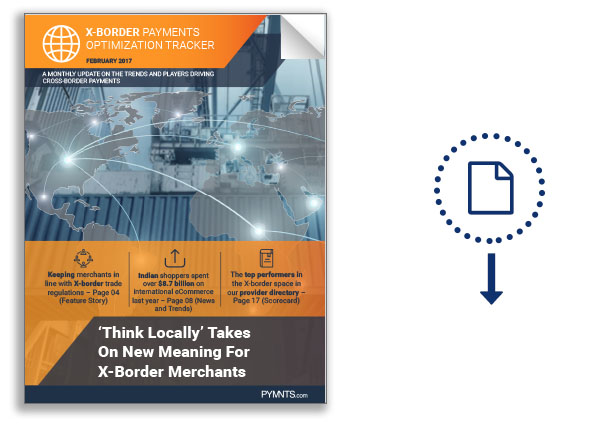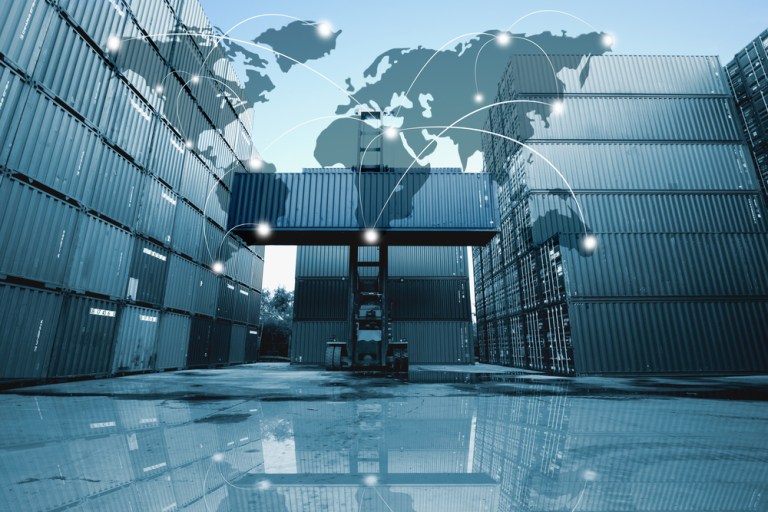With old rules evolving into new ones, geographic boundaries and their own set of regulations are just some of the many complexities that add friction to the process of international business. For merchants, conducting cross-border trade often means following another nation’s local rules around payment acceptance, compliance, taxes and physical requirements and a host of other factors that vary between borders.
And when merchants are dealing with these complexities, thinking locally can depend heavily on where a company’s headquarters is located as much as by the countries and regions in which it operates.
Navigating through this labyrinth is often a time-consuming challenge for merchants that makes thinking globally and acting locally all the more difficult. So, what’s a merchant to do?
PYMNTS spoke with Casey Bullock, general manager of North America for Worldpay, a global payments solutions provider that works with nearly 400,000 merchants operating in 126 currencies and 146 countries. Bullock discussed the compliance challenges of various payment scheme regulations that cross-border merchants often need to confront.
Political uncertainly and global trade
Advertisement: Scroll to Continue
With 2017 now in full swing, Bullock said he is encouraged by what he sees as a “strong economy” worldwide that shows signs of growth. He noted that Worldpay’s 2016 Global Payments Report anticipates the global eCommerce market will grow by 10.4 percent by 2020.
However, even with the global eCommerce market on the rise, political uncertainty around the world is bound to have a destabilizing effect on cross-border trade.
“The political turmoil has a knock-on effect on our industry,” Bullock said.
Bullock said businesses operating in the eCommerce space are often at the mercy of a variety of factors, including socioeconomic and political movements. As these movements take shape, they can alter political and economic landscapes, forcing businesses to quickly adjust to their new realities.
He pointed to last year’s Brexit vote as an example of a political event that added layers of uncertainty to the world market for cross-border merchants. Following the vote last year, freight, shipping and logistics companies saw their stocks tumble as these companies confronted the reality of having to rethink old relationships.
But while political events can cause economic uncertainty, Bullock advised merchants and companies that engage in cross-border trade to keep a level head.
“These things happen,” he said, referring to the Brexit vote. “As a business, we just try to prepare for those things and make sure that we’ve got a sound and promising business plan and that we are prepared for as many contingencies as we can think of.”
Bullock’s reaction to a large-scale event like Brexit might sound nonchalant, but London-based Worldpay and other companies were able to successfully emerge from the event on strong footing because they were prepared for the possibility of the outcome, he said.
And while political uncertainty can cause complications for businesses that engage in cross-border commerce, Bullock said companies should keep turning to international trade as a solution.
“If it becomes increasingly difficult for [companies] to do business in one particular market, there are plenty of other options,” said Bullock.
Because Worldpay is active in multiple markets, Bullock said, it was able to remain on strong footing during an uncertain political climate.
“We’re not just a one-market shop, and because of that fact, we will keep going strong even if things come up that punch us in the gut,” he said.
And considering world events can be so unpredictable, companies that engage in trade on the world stage must be prepared to handle uncertainty — even the uncertainty posed by large-scale movements like Brexit, he said.
“[Brexit] is one of those things that happens in the normal course of business, as odd as that may sound,” he said. “These are just odd things you have to try to prepare for as best you can.”
Staying compliant with local business rules
While it can be difficult to predict world events like Brexit, one thing companies can do to reduce uncertainty related to cross-border trade is learn the local rules of compliance. Bullock said merchants have to be aware of what their legal and financial obligations are in any country where they conduct business as they extend their reach across borders.
“The sense of requirements tied to how you process a transaction as a merchant, what is physically required of you as a merchant to be a domestic or a cross-border player and how that plays out across the different entities that a client might set up — those rules are definitely changing,” Bullock said.
Companies that are not in compliance with another nation’s trading rules can be in for a rude awakening. In 2015, a U.S. guitar manufacturer encountered trouble with Canadian customs when it tried to expand its sales operation there. Last year, cargo shipments from the Middle East to India were delayed for several months over issues with customs compliance.
With the regulations constantly changing, companies like Worldpay are tasked with interpreting the rules on behalf of clients to help companies navigate the complexities of international trade and helping these merchants stay compliant with the rules of their relevant payment scheme.
Navigating rules like this is where companies engaged in cross-border trade typically need help. For example, Bullock pointed out that the Turkish government requires a company’s IT infrastructure to be located in the country for payment processors to handle local transactions. He said this rule is in place in an effort to protect the local payment ecosystem and is one of several requirements that must be met by Turkey’s financial regulatory body before companies can be licensed to process payments.
“How do we make sure these guys are going to continue to process in a way that doesn’t get them in trouble with [various countries’] schemes?” said Bullock.
He cautioned that trouble can arise if a business misinterprets a requirement of conducting business internationally, and this can make navigating local cross-border markets all the more difficult. For example, some merchants are required to have a physical operation in the country where they pay corporate or sales taxes or be registered as a tax-paying entity in a certain country.
“Merchant location rules have changed in such a way where it’s not that easy to set up a physical shop,” said Bullock.
He pointed out that these rules were implemented to prevent some companies from dodging taxes and fees. But he also said the unintended consequence is that too many companies have to jump through hoops in order to stay compliant with local laws.
“At the end of the day, rules like that are put in place for a good reason,” Bullock said. “It’s really not meant to penalize the large-scale companies that are processing locally but don’t necessarily have a large-scale operation in country.”
These complexities can be overwhelming for both large and small merchants.
“This stuff is enough to make your head spin clean off,” he said.
For this reason, it’s important for merchants and vendors that specialize in compliance issues to stay on top of the rules.
“We’ve got to work on behalf of the [local] schemes that we’re following and make sure that we are compliant, and we also need to make sure our merchants are compliant,” Bullock said.
. . . . . . . . . . . . . . . .
To download the February 2017 edition of the PYMNTS X-Border Payments Optimization Tracker, click the button below.

ABOUT THE TRACKER
The PYMNTS X-Border Payments Optimization Tracker is the framework for evaluating players in the cross-border payments landscape, and the quarterly index tests the readiness of the companies to serve a global audience.




